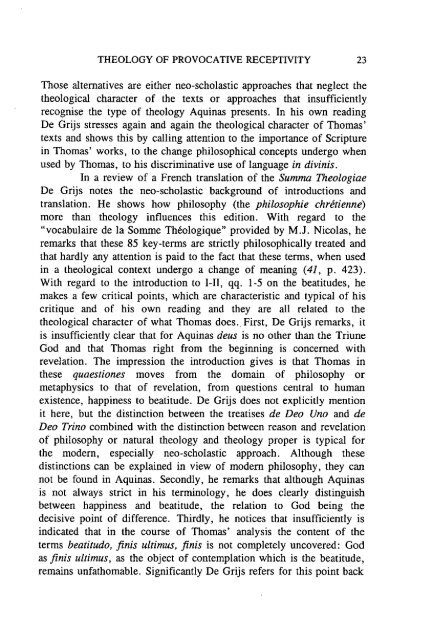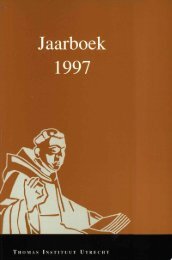Jaarboek Thomas Instituut 1995 - Thomas Instituut te Utrecht
Jaarboek Thomas Instituut 1995 - Thomas Instituut te Utrecht
Jaarboek Thomas Instituut 1995 - Thomas Instituut te Utrecht
You also want an ePaper? Increase the reach of your titles
YUMPU automatically turns print PDFs into web optimized ePapers that Google loves.
THEOLOGY OF PROVOCATIVE RECEPTIVITY 23<br />
Those al<strong>te</strong>rnatives are either neo-scholastic approaches that neglect the<br />
theological charac<strong>te</strong>r of the <strong>te</strong>xts or approaches that insufficiently<br />
recognise the type of theology Aquinas presents. In his own reading<br />
De Grijs stresses again and again the theological charac<strong>te</strong>r of <strong>Thomas</strong>'<br />
<strong>te</strong>xts and shows this by calling at<strong>te</strong>ntion to the importance of Scripture<br />
in <strong>Thomas</strong>' works, to the change philosophical concepts undergo when<br />
used by <strong>Thomas</strong>, to his discriminative use of language in divinis,<br />
In a review of a French translation of the Summa Theologiae<br />
De Grijs no<strong>te</strong>s the neo-scholastic background of introductions and<br />
translation. He shows how philosophy (the philosophie chrétienne)<br />
more than theology influences this edition. With regard to the<br />
"vocabulaire de la Somme Théologique" provided by M.J. Nicolas, he<br />
remarks that these 85 key-<strong>te</strong>rms are strictly philosophically trea<strong>te</strong>d and<br />
that hardly any at<strong>te</strong>ntion is paid to the fact that these <strong>te</strong>rms, when used<br />
in a theological con<strong>te</strong>xt undergo a change of meaning (41, p. 423).<br />
With regard to the introduction to I-II, qq. 1-5 on the beatitudes, he<br />
makes a few critical points, which are charac<strong>te</strong>ristic and typical of his<br />
critique and of his own reading and they are all rela<strong>te</strong>d to the<br />
theological charac<strong>te</strong>r of what <strong>Thomas</strong> does e , First, De Grijs remarks, it<br />
is insufficiently clear that for Aquinas deus is no other than the Triune<br />
God and that <strong>Thomas</strong> right from the beginning is concerned with<br />
revelation. The impression the introduction gives is that <strong>Thomas</strong> in<br />
these quaestiones moves from the domain of philosophy or<br />
metaphysics to that of revelation, from questions central to human<br />
exis<strong>te</strong>nce, happiness to beatitude. De Grijs does not explicitly mention<br />
it here, but the distinction between the treatises de Deo Uno and de<br />
Deo Trino combined with the distinction between reason and revelation<br />
of philosophy or natural theology and theology proper is typical for<br />
the modern, especially neo-scholastic approach. Although these<br />
distinctions can be explained in view of modem philosophy, they can<br />
not be found in Aquinas. Secondly, he remarks that although Aquinas<br />
is not always strict in his <strong>te</strong>rminology, he does clearly distinguish<br />
between happiness and beatitude, the relation to God being the<br />
decisive point of difference. Thirdly, he notices that insufficiently is<br />
indica<strong>te</strong>d that in the course of <strong>Thomas</strong>' analysis the con<strong>te</strong>nt of the<br />
<strong>te</strong>rms beatitudo, finis ultimus, finis is not comple<strong>te</strong>ly uncovered: God<br />
as finis ultimus, as the object of con<strong>te</strong>mplation which is the beatitude,<br />
remains unfathomable. Significantly De Grijs refers for this point back








